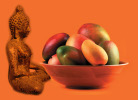You are here
Our Discoveries: Books, Films and Links
Tue, 03/23/2010 - 20:58 — Eve
"Green for Life" by Victoria Boutenko
This book is all about green smoothies. The author researched the diet of chimpanzees, our nearest wild relatives, and found that they grow big and strong on a diet of leaves and fruit. They have all day to chew their greens, breaking down the cell walls and releasing the bountiful nutrients within. We can get the same effect in moments by spinning greens and fruit together in a blender. Boutenko conducted a study with a group of people in southern Oregon who agreed to drink daily green smoothies for a month and claimed many health benefits.

Movie: "Food, Inc."
This film, by the producer of Al Gore's "An Inconvenient Truth," describes the nitty gritty of the American industrial food production system. In many ways it is shocking, although a lot of it deals with the meat and poultry industries and many of us are beyond them, or partly so. But perhaps more disturbing is the political and economic stranglehold a few corporations seem to have over virtually all commercial food production, animal and vegetable, the secrecy they work under, and the apparent impotence of the government regulatory agencies most of us assume are doing something to protect the food supply.
As part of my personal investigation into what the film says, I went to WINCO and walked every aisle looking at food ingredients; it was readily obvious that almost everything there had some component of processed corn or soy bean, exactly as documented.
I thought it an important enough film to buy a copy, which is available for Portland friends to borrow and watch.
It will change your feeling about walking into a food store, and I'll bet it gets more tomatoes planted in your yard!
The Jungle, by Upton Sinclair
The Jungle exposes the horrors of the early-20th-century meat-packing industry in Chicago through the story of Lithuanian immigrants, Jurgis Rudkus and his extended family, who arrive in the city looking for social and economic opportunity. It doesn't take long for their optimism to turn dark as they confront an unending string of almost unbelievable injustices and hardships embedded in a system set up to enrich the slaughterhouse owners and their business and political cronies. Sinclair learned about the stockyards and the tragic stories of the unfortunates who worked there by living and laboring among people like the fictional Rudkuses. The book almost overwhelms the reader with tales of injustice to workers and consumers alike, and it includes a graphic discussion of the cruelties visited upon the thousands of animals funneled daily into the yards for slaughter.
The hopeless situations Sinclair presents in The Jungle are redeemed by his compelling writing style and the reader's knowledge that upon publication in 1906 the book became a best-seller and aroused public anger that led to passage of the Meat Inspection Act and the Pure Food and Drug Act of 1906, and establishment of the Food and Drug Administration in 1930.
Beyond its focus on cruelty to humans and animals, the book offers a detailed look at the early years of the United States' economic boom. Looking at today's struggles between business and consumer that we read about almost daily, it's possible to draw parallels to a time when the greed of big business stood untamed and there was little concern about how the era would be represented in history books.